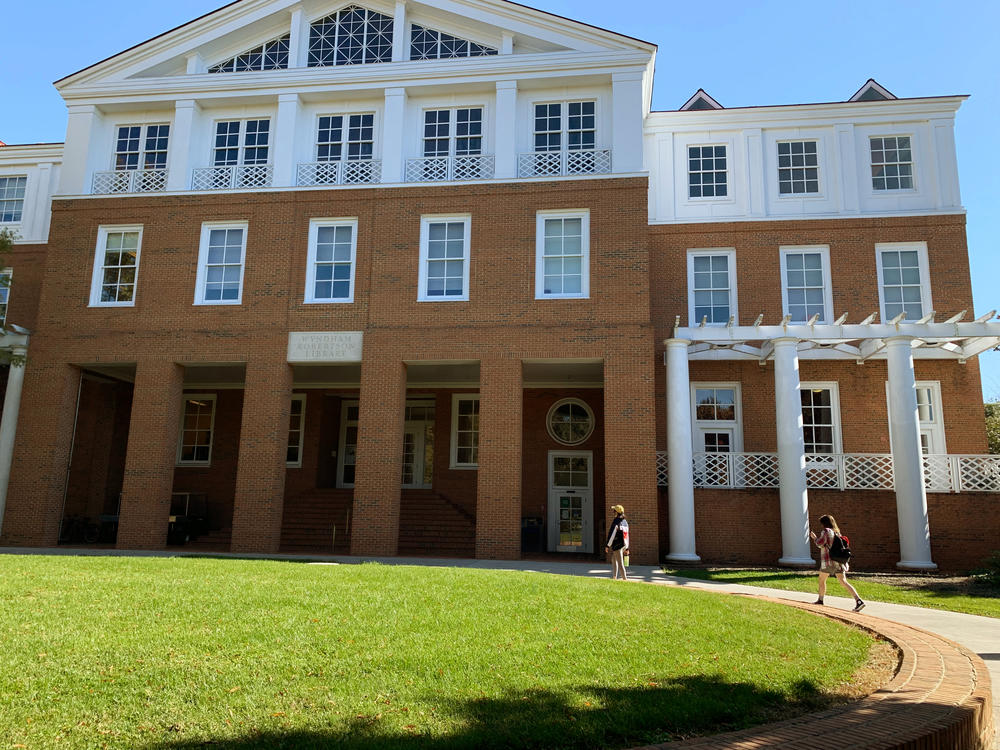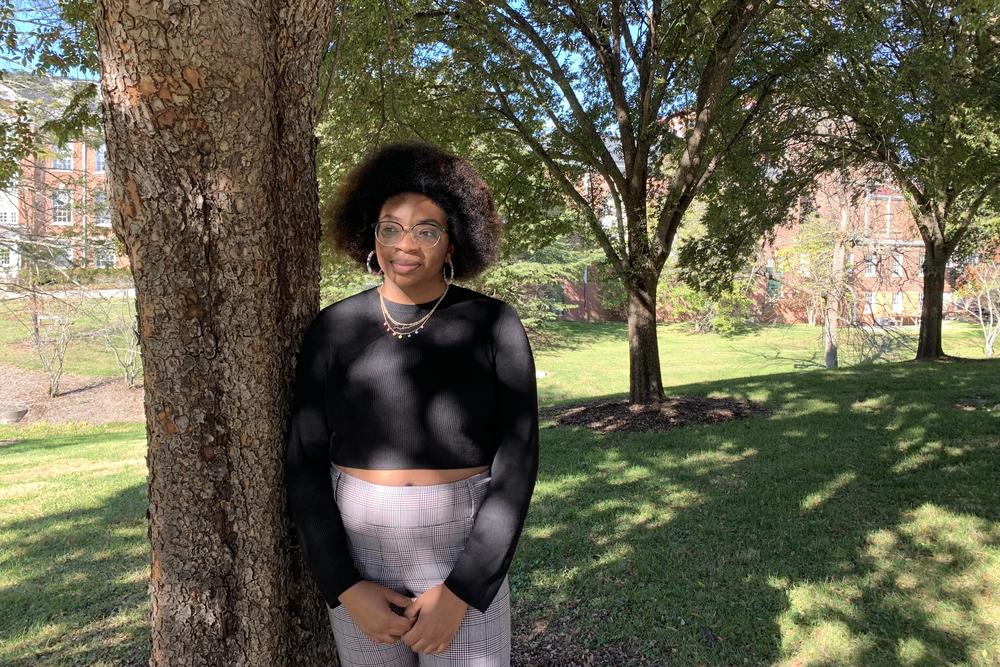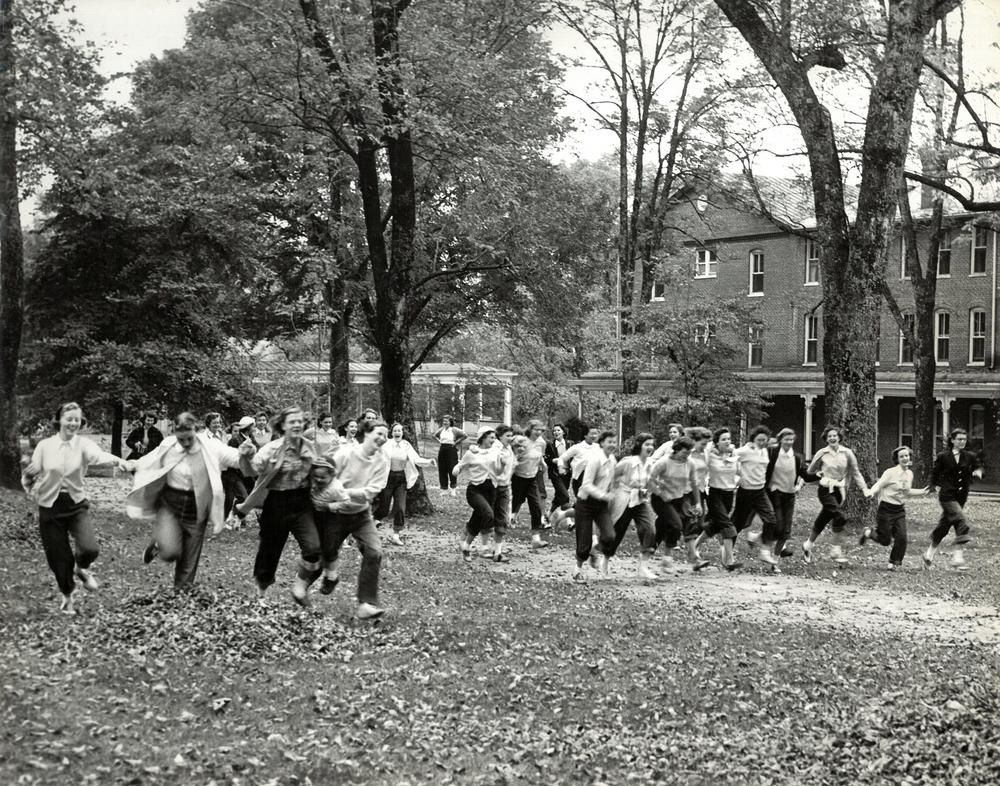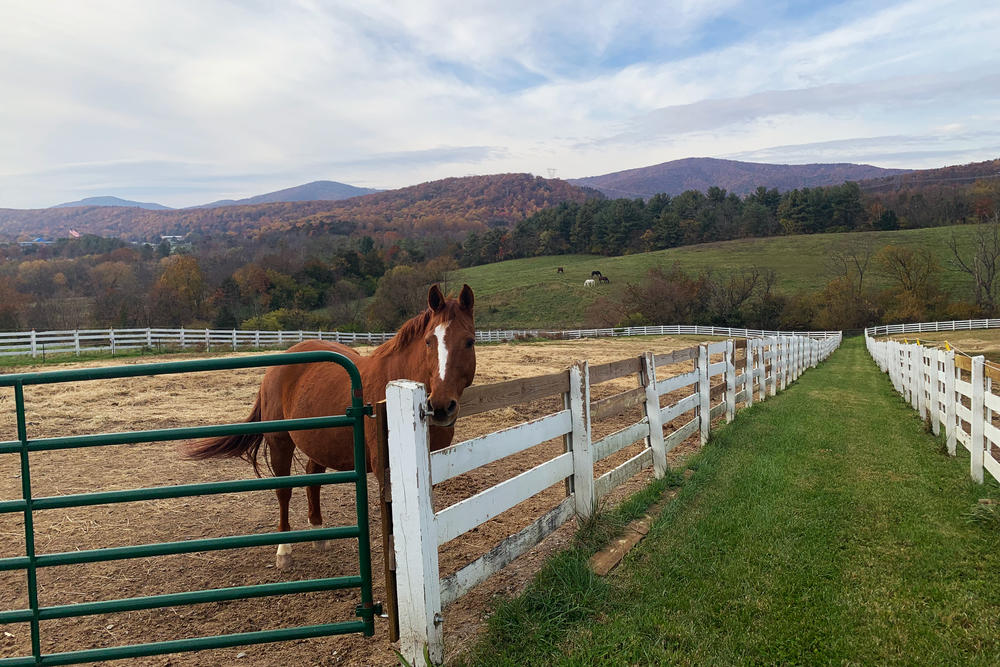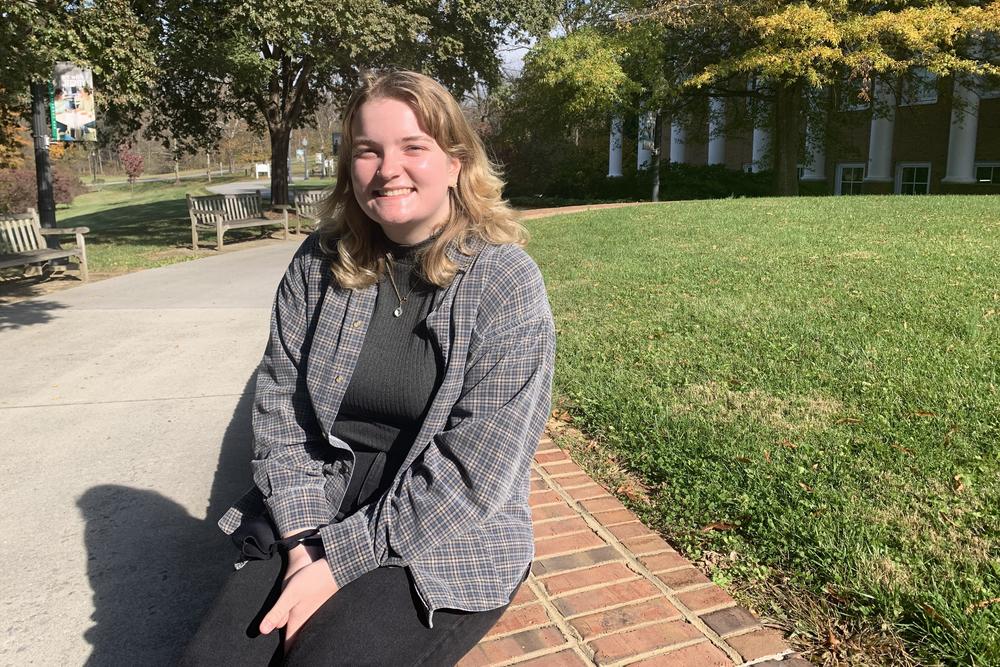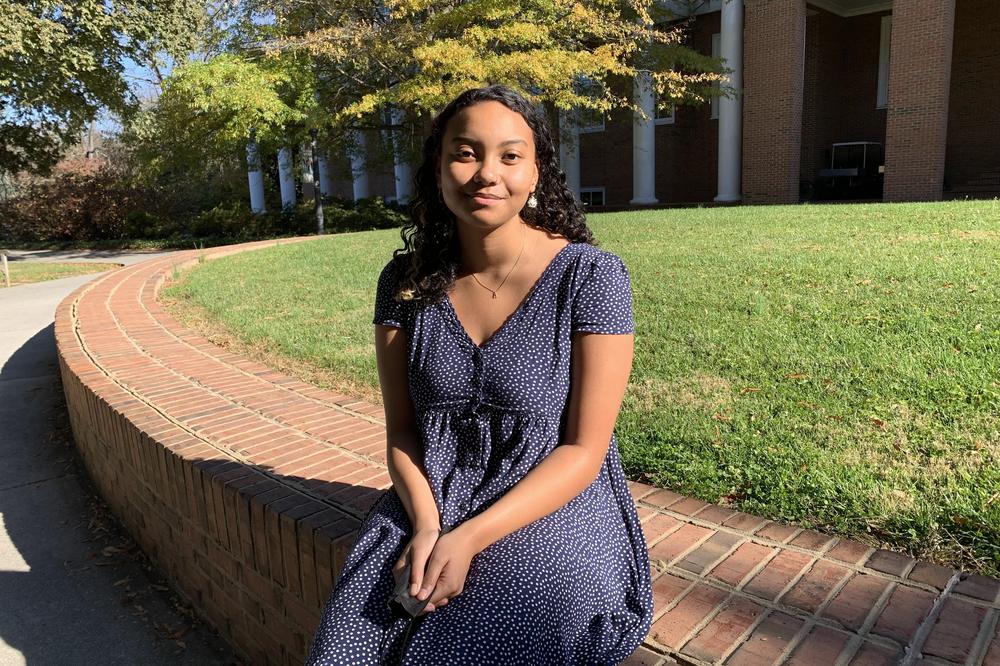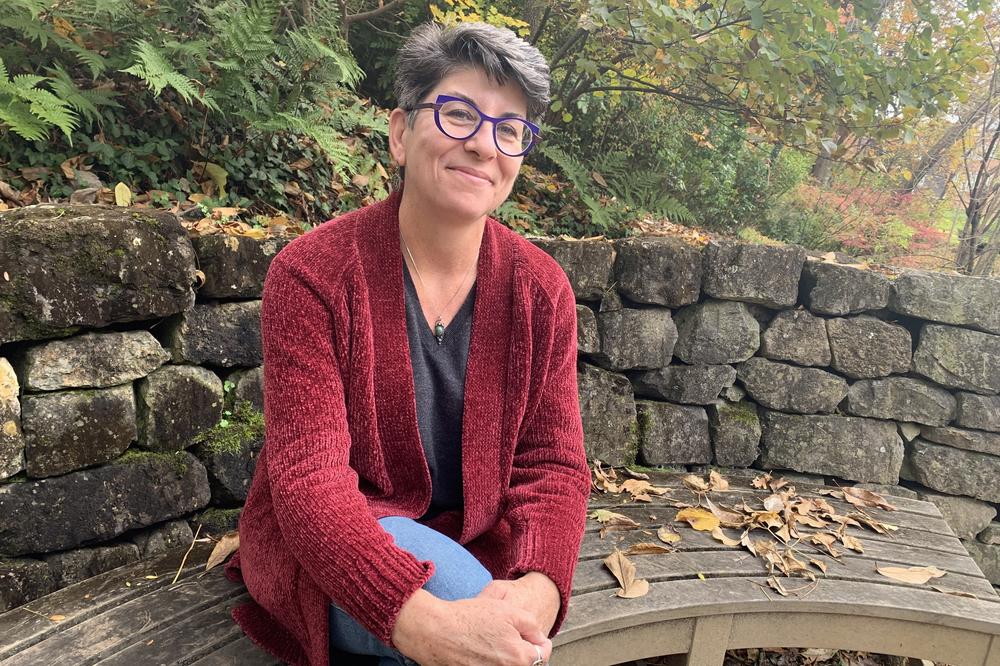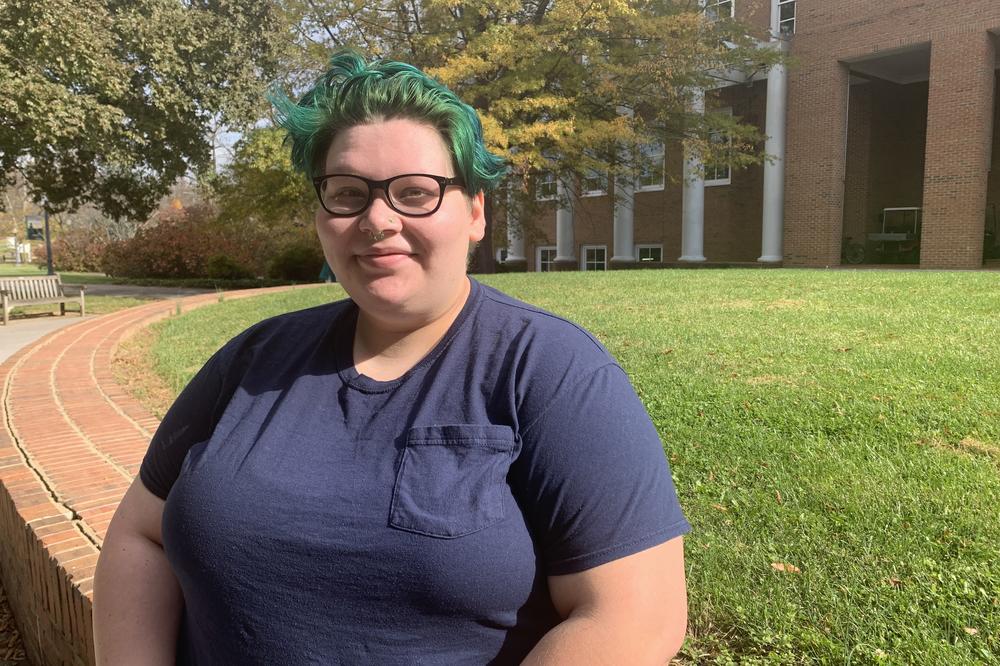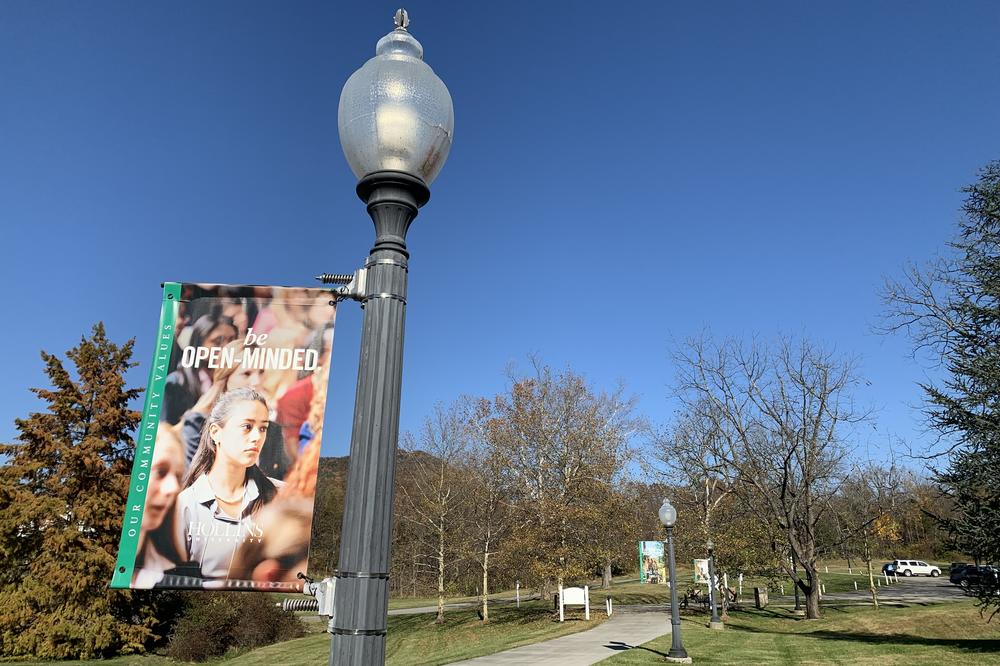Section Branding
Header Content
Who belongs at a women's college in 2021? Students want admissions policies to change
Primary Content
Toward the end of Kendall Sanders' first year at Hollins University, a historically women's college in Roanoke, Va., the sociology major had a realization.
"My journey has been, 'Girlhood does not define me,' " Sanders says. "My womanness, my femininity does not define me."
Sanders, a senior now, is nonbinary and uses the pronouns they/them.
"I was like, I don't think I care about being a girl," they say. For someone who grew up in the Bible Belt region of Little Rock, Ark., that realization was a pretty big deal.
"I really just want to escape the binary in general, to do away with it," Sanders says. "I don't want to spend my life trying to prove that I am one gender. I want to wake up, put on some clothes, go out into my day. If you perceive me as one gender, that's OK, too. But for me, it just is what it is."
At a time when more young people, like Sanders, identify as nonbinary or transgender, admissions policies at historically women's colleges have loosened to reflect that shift.
Hollins is among the latest schools to revise its policies, explaining that the 2019 change came "in recognition of our changing world and evolving understanding of gender identity."
Yet, the school's new policy still specifically excludes nonbinary applicants.
"That's crazy," Sanders says, a view echoed by many NPR spoke with on the southwest Virginia campus.
"Consistently live and identify as women"
Under Hollins' previous policy, dating from 2007 and revised in 2013 and 2016, if a student assigned female at birth began transitioning to male while enrolled, they were required to transfer out.
Now, according to the new rules set by the board of trustees, that trans male student can remain and graduate from Hollins.
Hollins' guiding principle on admissions is that it will consider applications from those who "consistently live and identify as women." (Other historically women's colleges use virtually identical language, including Barnard, the College of St. Benedict, and Spelman.) That includes transgender women.
But the specific exclusion of nonbinary applicants seems for some to be an anachronism.
"My students at these colleges, they laugh at that, and they're like, 'What does [consistently living and identifying as women] even mean?' " says Megan Nanney, who studies gender policies at historically women's colleges, and who taught at Hollins from 2020-21. "And I'm like, 'Well, that is the question that gender studies scholars have always asked, right?' "
A proud history educating women in Virginia
Hollins is a small, tight-knit community — just about 700 undergraduates — with a campus set against the backdrop of Virginia's Blue Ridge Mountains. The school has a proud history educating women, going back to 1842, and its reputation as a finishing school for southern debutantes is long gone.
According to a promotional school slogan, "Women who are going places start at Hollins." Among the college's illustrious graduates: writers Annie Dillard and Natasha Trethewey, and photographer Sally Mann.
The school is well-known for its equestrian team, and some students bring their own horses with them to board at the campus stable.
The equine program was a big draw for first-year student Diana Combs of Bethesda, Md., who considers it a plus that Hollins is a historically women's college.
"I just feel safer overall," she says. "Especially [since] we have no frats here, which is a lot better. So, yeah, horses and all women - yeah!"
"A refuge from patriarchal structures"
For sophomore Willow Seymour, from Las Vegas, Hollins' admissions policy doesn't make sense.
"Personally, I think it's pretty offensive to exclude nonbinary people," Seymour says. "I know that historically it's a women's college, but a lot of people see it as, like, a refuge from patriarchal structures, and nonbinary people deserve to be as much part of that as anyone else."
Seymour began identifying as genderqueer this semester. If that was who they knew themself to be in high school, Seymour says, they would have had to conceal that on the Hollins application.
"I think that's a really messed up thing, having to hide a part of yourself just to go somewhere," Seymour says.
As for the school slogan, "Women who are going places start at Hollins"?
"I think that's something that should be phased out," says Jaiya McMillan, a Hollins junior from Las Vegas, "because there are so many people here who are going places who are not just women, you know?"
McMillan is vice president of the student government and is the daughter of a Hollins alumna. Her mother graduated in the class of 1995.
"I know that she talks about it as a women's college," McMillan says, "and there are still professors here who only use she/her pronouns when talking about the student body, which obviously I don't think really fits what Hollins looks like anymore."
McMillan, who is cisgender, says Hollins should be a place that welcomes all nonbinary and transgender students, too.
"Absolutely. Absolutely! I think maybe a school with everything under the sun... except for [cisgender] men," she says.
A more gender-fluid student body
If it were up to Hollins professor LeeRay Costa, the college would change its admissions policy to include nonbinary students — anyone, she says, whose gender makes them marginalized in society.
Costa, who has taught at Hollins for 20 years, has seen the name of her department change from Women's Studies to Gender and Women's Studies. She's also seen the number of nonbinary students grow, especially within the last five years or so.
"We see a lot more fluidity," Costa says, "so people moving along a spectrum, and not feeling like they have to be fixed in one place, and exploring."
As to the fear that something will get lost, or diluted, if the door to women's colleges is opened too wide?
"That question is to me, it's rooted in this either/or binary of like, it's either for women or it's not for them. And I reject that binary," Costa says. "I don't think it needs to be an either/or kind of question."
Feeling a disconnect with school policy
Em Miller, a nonbinary senior from Amelia, Va., often serves as a sounding board for younger students who want to try out new pronouns or a new name.
"There's kind of this like wading pool area where you kind of just dip your toes in, and you see how you feel about it, and then you go further," Miller explains, during a conversation outside the Hollins library.
Miller was a sophomore when the Hollins Board of Trustees updated its policy in 2019, loosening its rules on trans male students but adding the new language that specifically excludes nonbinary applicants.
Miller says once you're on campus, Hollins feels inclusive: Students and faculty embrace gender diversity. But there's a disconnect with the school's admissions policy, Miller says, and that doesn't sit well.
"It makes me feel ignored. And it almost feels like I'm battling against what Hollins' board of trustees has kind of placed as this looming cloud over students at Hollins," Miller says.
In an interview with NPR, the chair of Hollins' board, Alexandra Trower responded: "I have a lot of compassion and empathy for those feelings. But we are a women's institution."
Not just a historically women's college, Trower emphasized, but a present women's college — which is important, she said, at a time when women have still not achieved equity.
"I very much appreciate that students may have a different definition or desire to have us be in a different place," Trower said, "but we're very clear and open about what our mission is. And people have a choice about where they go to university."
Trower concedes that it's possible the Board's thinking on this will evolve. That's the message, too, from Hollins' president, Mary Dana Hinton, who took office in 2020, after the revised admissions policy was already in place.
"My heart aches at the thought of someone feeling unseen, unaffirmed, uncared-for," Hinton says. "And I don't think it's unexpected that we will continue to listen and learn and reassess the policy as needed."
Overshadowing this discussion is the fact that a dozen historically women's colleges have either closed or gone coed in the past seven years — faced with declining enrollment, or financial trouble.
Each school, trying to figure out how to adapt in a more gender-fluid world.
Copyright 2021 NPR. To see more, visit https://www.npr.org.
